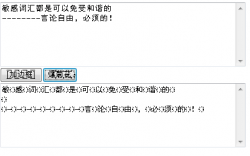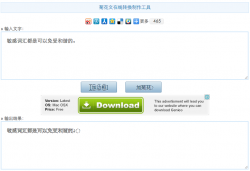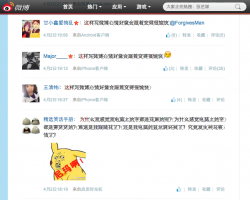“Chrysanthemum script”的版本间的差异
来自China Digital Space
(→中国数字空间) |
|||
| 第15行: | 第15行: | ||
<div style="column-count:2;-moz-column-count:2;-webkit-column-count:2"> | <div style="column-count:2;-moz-column-count:2;-webkit-column-count:2"> | ||
{{ #dpl: linksto = 火星文 }} | {{ #dpl: linksto = 火星文 }} | ||
| − | {{ #dpl: linksto = | + | {{ #dpl: linksto = 艾芬 }} |
* [https://chinadigitaltimes.net/space/Special:Random 漫游数字空间] | * [https://chinadigitaltimes.net/space/Special:Random 漫游数字空间] | ||
</div> | </div> | ||
[[分类:Lexicon]][[分类:Resistance Discourse]] | [[分类:Lexicon]][[分类:Resistance Discourse]] | ||
2024年10月23日 (三) 05:35的最新版本
菊花文 (júhuā wén): chrysanthemum script


Coded writing using the Combining Cyrillic Millions character ( ҉ ; Unicode: U+0489). Typically used in bi-directional text, where both left-to-right and right-to-left scripts are used simultaneously, Chinese netizens have employed ҉ to obscure sensitive online discussion.
When Combining Cyrillic Millions ( ҉ ) is inserted between each character in a word or phrase, the ҉ overlays each character, making it difficult to automate censorship. Online converters allow Internet users to create chrysanthemum script automatically.
҉ used to be blocked on Weibo, but is now searchable. It appears that using chrysanthemum script either have fallen out of fashion, or is no longer a viable technique to skirt censorship.
See also Martian script.
中国数字空间
- Martian script
- VOA
- 东南西北论谈
- 中文网志年会
- 人类学
- 何兆武:中国为什么没有产生近代科学?
- 历史的先声
- 合成生物学
- 同意
- 大明英烈传
- 好好好
- 学界人士
- 宪政论衡
- 屠呦呦
- 崔卫平:我是一只草泥马
- 戴耀廷
- 数字行动主义
- 李文亮
- 某站审查词不完全列表(2020年五月更新)
- 洪振快
- 王洪喆:从“草泥马”事件看中国互联网的内容审查、网络文本抵抗与网民亚文化
- 白睿文
- 白衬衫:爱国不等于爱朝廷
- 石扉客2023
- 神经现实
- 群众演员
- 范美忠
- 被踩3700次
- 西祠胡同
- 许章润
- 赵士林
- 钱三强
- 阮耀钟
- 陈纯
- 饶毅
- 饶议科学
- 魔法上网





